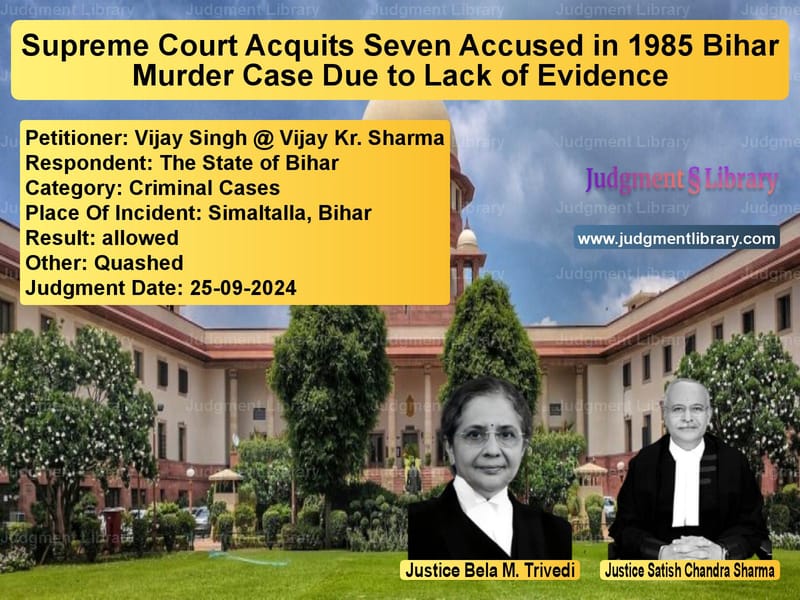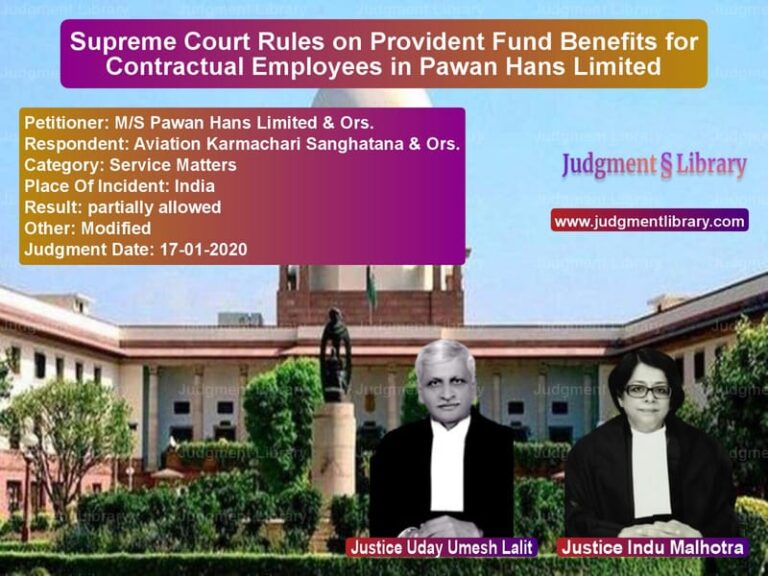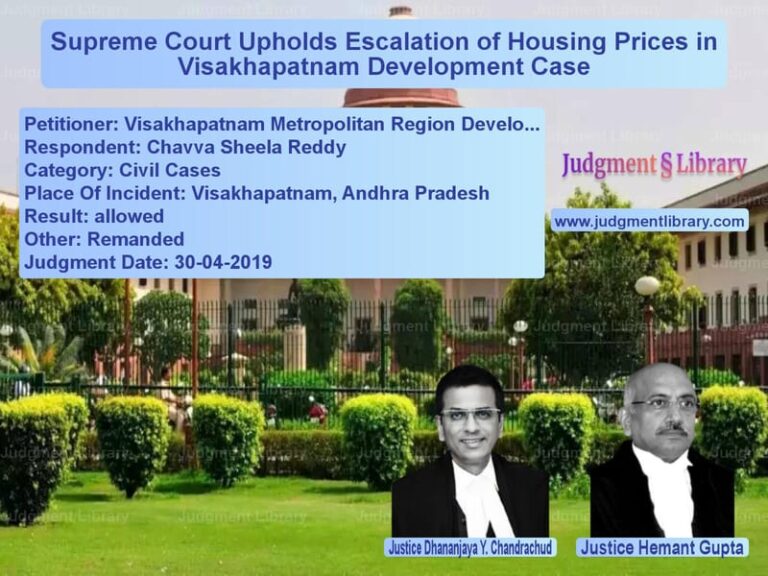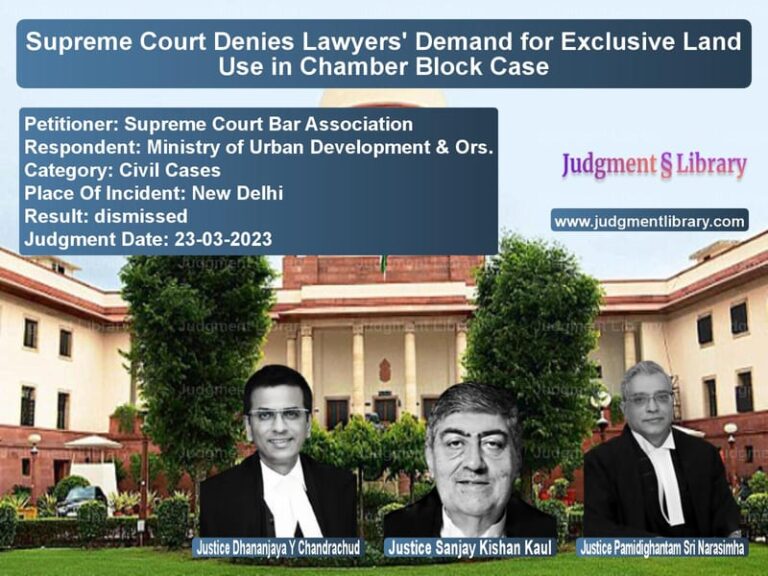Supreme Court Acquits Seven Accused in 1985 Bihar Murder Case Due to Lack of Evidence
The Supreme Court of India recently delivered a significant judgment in Criminal Appeal No. 1031 of 2015 and connected appeals, acquitting seven accused in the 1985 Bihar murder case due to a lack of substantial evidence. The case revolved around the alleged abduction and murder of Neelam, with the primary motive being a property dispute. The apex court found the evidence presented by the prosecution unreliable and ruled that the accused could not be convicted beyond a reasonable doubt.
Background of the Case
The case dates back to August 30, 1985, when Neelam was allegedly abducted from her residence in Simaltalla, PS Sikandra, District Munger, Bihar. Her brother-in-law, Ramanand Singh (PW18), filed an FIR against seven accused individuals: Krishna Nandan Singh, Ram Nandan Singh, Raj Nandan Singh, Shyam Nandan Singh, Bhagwan Singh, Vijay Singh, and Tanik Singh. They were charged under various sections of the Indian Penal Code (IPC), including 302 (Murder), 364 (Kidnapping), 449 (House-trespass), and 120B (Criminal Conspiracy).
Trial Court Proceedings
The trial court convicted five of the accused under Sections 302/34 and 364/34 IPC, sentencing them to life imprisonment. The remaining two accused, Vijay Singh (A-6) and Tanik Singh (A-7), were acquitted due to a lack of evidence linking them to the crime.
High Court Judgment
Upon appeal, the Patna High Court upheld the conviction of the five accused and overturned the acquittal of A-6 and A-7, convicting them as well under Sections 364/34 and 302/34 IPC. This decision was challenged in the Supreme Court.
Arguments by the Appellants
The defense presented the following arguments before the Supreme Court:
- The prosecution failed to establish a credible motive for A-6 and A-7’s involvement in the crime.
- The prosecution’s key witnesses were unreliable and provided conflicting statements.
- The prosecution did not produce key witnesses, including the tenants residing in the house where the abduction allegedly occurred.
- Medical evidence contradicted the prosecution’s timeline of events.
- The trial court had correctly acquitted A-6 and A-7, and the High Court erred in reversing the acquittal.
Arguments by the State
The prosecution, representing the State of Bihar, countered the appeal with the following points:
- Eyewitness testimonies from PW2, PW4, and PW18 confirmed the abduction.
- The crime was motivated by a property dispute, as Neelam had possession of a house that the accused wanted to reclaim.
- The delay in filing the FIR was justified due to the fear and intimidation exerted by the accused.
- The prosecution presented circumstantial evidence linking all accused to the murder.
Supreme Court’s Observations
1. Unreliable Witness Testimonies
The Court found inconsistencies in the statements of key prosecution witnesses:
“The testimonies of PW2, PW4, and PW18 suffer from contradictions, raising reasonable doubt about their credibility.”
2. Non-Examination of Key Witnesses
The prosecution failed to produce crucial witnesses, including tenants who could have confirmed Neelam’s residence at the house where she was allegedly abducted.
“No direct evidence was presented to confirm Neelam’s residence at the alleged place of abduction.”
3. Doubts Regarding Medical Evidence
The Supreme Court noted discrepancies in the post-mortem report. While the prosecution claimed Neelam was killed at 10:00 PM on August 30, 1985, the medical report suggested death occurred around 5:00 PM, contradicting the prosecution’s timeline.
“The post-mortem report indicates a significant time gap between the alleged time of abduction and the estimated time of death, raising doubts about the prosecution’s version of events.”
4. Motive Alone Cannot Prove Guilt
The Court held that motive alone is insufficient to convict an accused when substantial direct evidence is lacking.
“While the property dispute provides a possible motive, the prosecution failed to prove the actual commission of the crime beyond reasonable doubt.”
5. Flawed Approach of the High Court
The Court ruled that the High Court erred in reversing the trial court’s acquittal of A-6 and A-7 without finding concrete evidence of their involvement.
“A finding of acquittal can only be reversed when the prosecution establishes strong evidence of guilt beyond reasonable doubt.”
Final Judgment
The Supreme Court acquitted all seven accused, ruling that the prosecution had failed to prove the case beyond reasonable doubt:
“The appeal is allowed. The convictions are set aside, and the appellants are acquitted of all charges. They shall be released forthwith if not required in any other case.”
Impact of the Judgment
This landmark ruling has significant implications for criminal jurisprudence in India:
- Burden of Proof: The judgment reaffirms that the prosecution must establish guilt beyond reasonable doubt.
- Reversal of Acquittals: The decision highlights that appellate courts should be cautious when overturning trial court acquittals.
- Importance of Witness Credibility: The case underscores the need for reliable and consistent witness testimonies.
- Medical Evidence in Criminal Trials: The ruling emphasizes that forensic reports must align with the prosecution’s narrative.
By setting aside the convictions, the Supreme Court has reinforced the principle that no individual should be convicted based on conjecture and unreliable evidence.
Petitioner Name: Vijay Singh @ Vijay Kr. Sharma.Respondent Name: The State of Bihar.Judgment By: Justice Bela M. Trivedi, Justice Satish Chandra Sharma.Place Of Incident: Simaltalla, Bihar.Judgment Date: 25-09-2024.
Don’t miss out on the full details! Download the complete judgment in PDF format below and gain valuable insights instantly!
Download Judgment: vijay-singh-@-vijay-vs-the-state-of-bihar-supreme-court-of-india-judgment-dated-25-09-2024.pdf
Directly Download Judgment: Directly download this Judgment
See all petitions in Murder Cases
See all petitions in Bail and Anticipatory Bail
See all petitions in Fraud and Forgery
See all petitions in SC/ST Act Case
See all petitions in Judgment by Bela M. Trivedi
See all petitions in Judgment by Satish Chandra Sharma
See all petitions in allowed
See all petitions in Quashed
See all petitions in supreme court of India judgments September 2024
See all petitions in 2024 judgments
See all posts in Criminal Cases Category
See all allowed petitions in Criminal Cases Category
See all Dismissed petitions in Criminal Cases Category
See all partially allowed petitions in Criminal Cases Category







